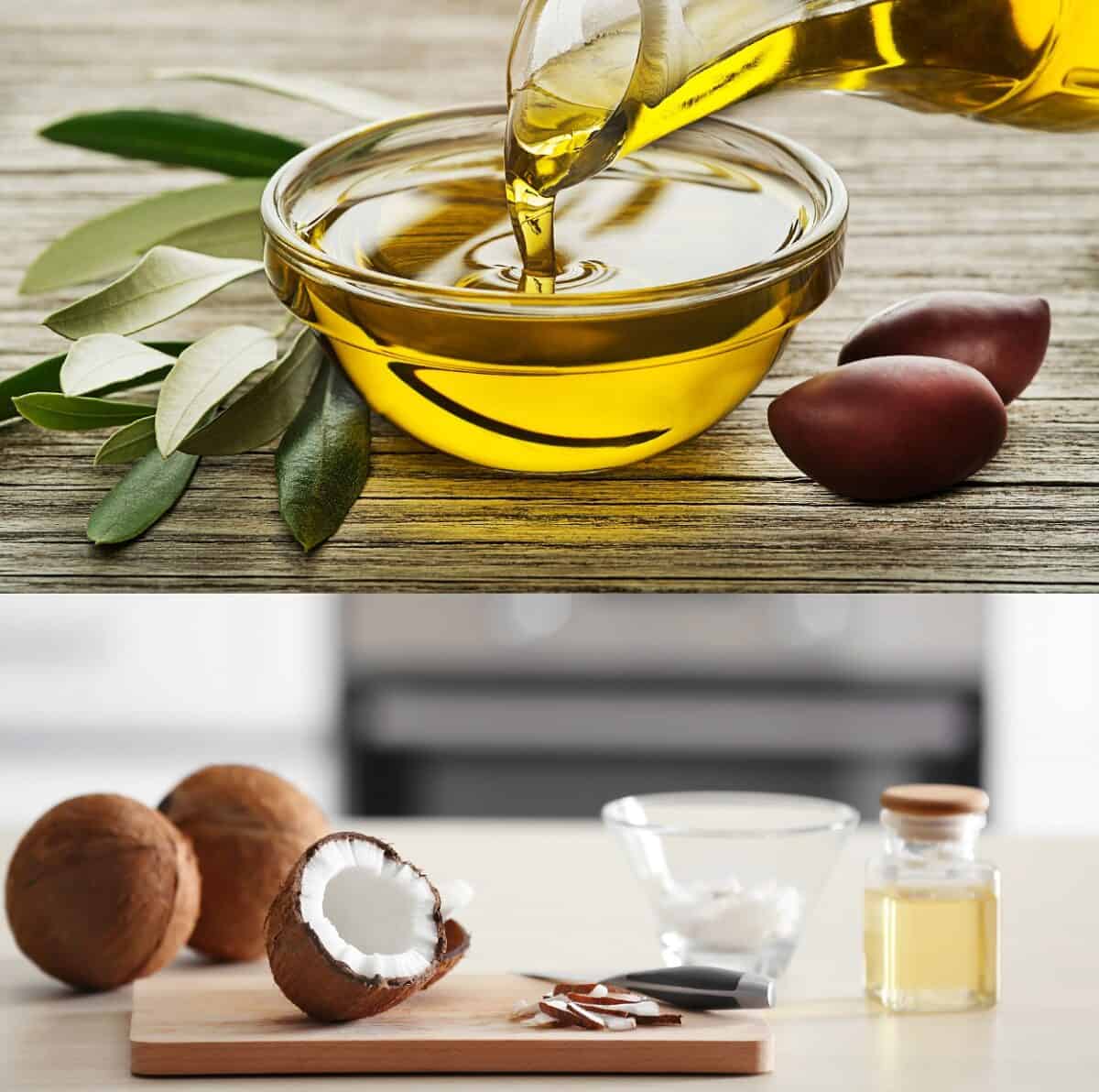Last Updated on 17th December 2021 by
I know that to some people, each kind of cooking oil is interchangeable. One seems just as good as another, but substituting one for the other doesn’t always work out well. I know some people are curious about when cooking, can you substitute coconut oil for olive oil vs canola oil? All of these different oils have different properties.
How you cook with them and the kind of results they produce are important. What is even more important for many people, however, is the healthiness of one oil compared to another. Can you substitute coconut oil for olive oil and it not affect your health? That’s a great question and one I want to answer briefly before we get into the cooking aspects of using these different oils.
It’s not fair to say oils contain fat- they are literally a kind of fat. No matter which kind of oil you are using, you are going to put fat into your body and the bodies of anyone who consumes the food you are making. Not all fat is created equal, though. Some fats are pretty good for you in limited quantities. That kind of fat is known as HDL and can be beneficial to your cholesterol and heart health. LDL is the bad kind of fat, which hurts your heart and clogs your arteries. A lot of fried foods contain LDL, which is the main reason why you should limit how much fried foods you eat.
Getting back to coconut oil vs olive oil, which is healthier? Coconut oil can give you both LDL and HDL fats, so it’s not as bad for you as some of the other kinds of oils you could be using. Olive oil is mostly HDL fat, so it is a bit healthier. You can substitute one of the other, and the affect on your health should not be much different, especially if you are using the oil sparingly. That’s always a good idea- to limit how much oil you consume, especially in fried form.
Let’s get down to the question of can you substitute coconut oil for olive oil in salad dressing and in other kinds of foods.
When to Use Coconut Oil for Cooking
How you use an oil determine how it tastes and the texture it creates in the food. So, using coconut oil or frying foods and using it for baking a cake, for instance are two different matters. You can’t expect the same results, as frying and baking are two different methods of heating food. Then, if you use coconut oil in a salad dressing instead of olive oil, the tradeoff will be different than if you replaced one for the other in sautéing vegetables.
Coconut oil can be used interchangeably with olive oil in certain situations. One of those is when you are sautéing foods. So, cooking in a food in a small amount of oil should work the same way regardless of whether you are using coconut oil or olive oil. Even if the recipe calls for extra virgin olive oil, the two kinds of oils can be used as you need them. If you are cooking up some onions or mushrooms in oil, it doesn’t matter whether you are using olive oil, extra virgin olive oil or coconut oil. They all work the same, though the taste profile will be a bit different. When you try working with a different one, you may have a preference once you taste them.
You can use the same amount of coconut oil as you would olive oil, so that makes for an easy conversion.
Can you substitute coconut oil for olive oil in pasta? You could, but you definitely get a different taste that might not be one you want. To use them interchangeably may be out of the question, as coconut oil has a flavour that will stand out more when it is not really cooked and you are making pasta.
A lot of times, pasta will be drizzled with olive oil to keep the pasta from sticking. That is a quick and easy way to add to the flavour and give it the right texture and consistency. Can you use coconut oil the same way? You could, and you would use the same amounts, but be warned that the flavour will be distinctly different. Coconut oil is a bit sweeter than olive oil, and you may need to counter that with some added seasonings. Consider using the coconut oil in pesto or in some other kind of sauce or herb mixture that would help to hide the flavour more.
Can you substitute vegetable or coconut oil in salad dressing for olive oil? You could do that as well, but once again you have the problem of the changed flavour. Salad dressing that has a lot of seasonings in it may work fine with the substitution, but not all kinds of salad dressings will accommodate coconut oil as a reasonable substitute for olive oil. You can try it and see how you like it, and I don’t want to dissuade you from trying new things and getting more use out of your coconut oil, but just be ready for a flavour change that you might not be happy with.
Can You Substitute Olive Oil for Coconut Oil?
Here is a tricky question. Can you substitute the two kinds of oils the other way? Some of the same rules would apply, obviously. If you can use them interchangeably in a situation, like for when you are sautéing, for example, then using one rather than the other doesn’t matter. Feel free to go with whichever you choose.
Coconut oil is sometimes used in brownies, cakes, and other desserts. I would not suggest changing that out with olive oil because of the way it will affect the sweetness. If you do want to change them out anyway for your dessert, consider adding some extra sugar to even out the sweetness back to where it should be.
It’s not always a great idea to change out one kind of oil for another, as you will be influencing the flavour profile and making your food taste different. Sometimes, you don’t have any other options, though, and you need to work with what you have. It’s understandable then that you will want to use coconut oil instead of olive oil, or the other way around. If you know how to work with the flavour difference and fix it where needed, then you can make the substitution work well for you.
I'm Pauline, a mother of four grown children, my passion for cooking stemmed from the joy i get cooking for my family. I love to try new dishes, especially when dining out but creating and sharing my own recipes is my favourite thing to do!



saltoed
Friday 21st of February 2025
KR0KozCPGaH